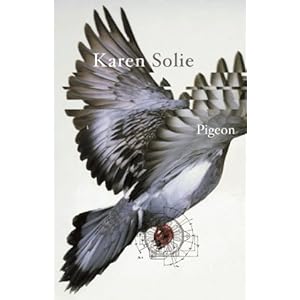 The Canadian national tourist board might want to ban this book. Pigeon is full of landscapes – industrial hinterland, degraded countryside – without a centre or purpose except to serve the needs of human consumption. The internal landscapes mirror this with their existential angst, and the poems’ standpoint is sometimes rootless, aimless.
The Canadian national tourist board might want to ban this book. Pigeon is full of landscapes – industrial hinterland, degraded countryside – without a centre or purpose except to serve the needs of human consumption. The internal landscapes mirror this with their existential angst, and the poems’ standpoint is sometimes rootless, aimless. At the same time there is an enormous energy and zest in many of the poems, plus a wide perspective and laconic humour. Here’s the beginning of ‘Medicine Hat Calgary One-Way’:
The bus is a wreck, and passengers
respect that, a mild unease aboard
this have-not province
with its per-capita demographic representation
of unfortunates, poor earners, procrastinators,
the criminal element, hammering away
at the dullest stretch of highway
on earth. Local industrial calamities,
unmistakeable turquoise PVC of the deadly prairie
waterslide, tractor-trailers, poorly tied
private loads, all of it
ill-used and ugly in early spring,
though bright hawks balance on warming
updrafts…
The long words and piling-up of detail are typical. Some of the detail is very vivid: in the title poem, one of the few short, lyrical pieces, the human brain is described as ‘three pounds soaking wet, / its attentions divided.’ Most poems are longish, and written in chunks of free verse, many with long lines, so when one flips through the pages the book looks solid. But Solie can do short lines too:
The river is laden with suspended
particles of finely powdered
rockflour. All colours
of the light spectrum are absorbed
but for what these particles
reflect.
Presumably this passage from ‘Bow River Preludes’ describes waste from mining operations; she’s good on the detail of damaged environments. Here’s some of the final part of the same poem:
The river is older than the mountains folding
in heaves around it. From here, everything follows
eastward in rational or irrational
arrangement. Warmed by ingredients, fibrous,
acquiring odours of its passage, it mingles
with the Oldman and the Red Deer at the feet
of cities..
And here she is on the human aspect, from ‘Listening to The revelator’:
The loneliness composed on the road, after hours,
off-shift, out of it, or left behind, the vindictive
clairvoyance of local law enforcement…
… making
the best of being stuck where you were,
in those rooms now creaking in a forest of outlived rooms
recalled as eras are recalled….
This poem ends:
Your life built on intervals
the way a chord is, on changes that alter you
by thirds, by fifths, in silences the progression climbs
to where each song ends, and the next begins.
That lyrical ending is all the more effective for being a surprise. The poem is written in one block, which is fine, but I wonder whether it does justice to all the striking thoughts and images the poem contains. It’s easy not to take half of them in.
The ending is also an example of the sheer confidence of some of Solie’s statements. There is a tension between this and the angst and rootlessness which works very well. Here’s another ending, from ‘Dog Star’:
… an idea assembles, as does the darkness
in the east. But it’s too late.
Because once again the part of the mind
called the heart appears on the threshold,
swinging its amnesias before it like a lantern.
Pigeon is a North American length, around 90 pages, split into five parts. And this is a poet who needs to be re-read a lot. It must be said that the book’s subject-matter can be depressing – the accumulation of poems about poverty of people’s lives and environment, the consequences of human actions. But this is stuff that needs to be written about, and I admire her for addressing it so well, without making the reader feel told. I keep finding more passages I’d like to quote. Sometimes the energy slackens a bit, but then comes a passage like this:
Worth leaving the highway for. Gorgeous
at sunset, really outstanding,
the potato chip factory at the east end
of Taber, which is a kind of town.
It’s painted a bright and not entirely baffling
turquoise, for who would want
their snacks to issue from a dour scene?
Karen Solie was brought up on an industrial farm in Saskatchewan, which on the map is a vast swatch of prairie. There’s an interview with her here, during which she reads a few poems from the book.
Pigeon was published by Anansi in 2009, and won the Griffin Prize. It’s in the Poetry Library (or will be, in the next few days when I’ve taken it back). I was the first person to borrow it – hope it gets read a lot more.
And I was the second - a year later. I quote quite different things from you on my amazon.com review! Now she's a Full Time Writer she's working on The Novel. Do hope success doesn't blunt her edge..
ReplyDeleteA great shame more people aren't reading it. I do get pageviews for this post, but they're from N America. And I wrote it when I'd just started the blog, so my blog stats were close to zero. I might review 'Modern & Normal' one day soon.
ReplyDeleteAmusing about the different quotes. As you say in your review, the poems are eminently quotable.